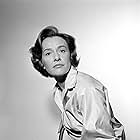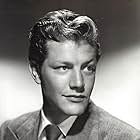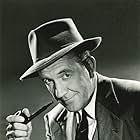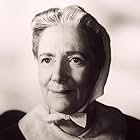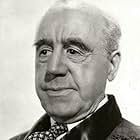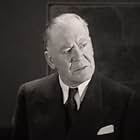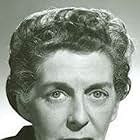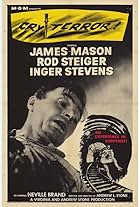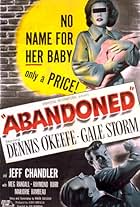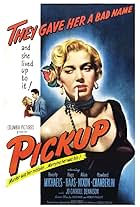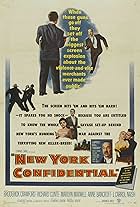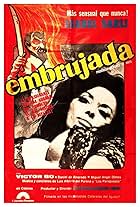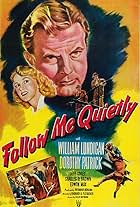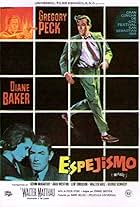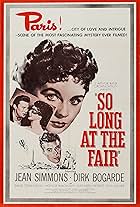Añade un argumento en tu idiomaA young woman has two distinct personalities, one of whom is evil and constantly gets her in trouble.A young woman has two distinct personalities, one of whom is evil and constantly gets her in trouble.A young woman has two distinct personalities, one of whom is evil and constantly gets her in trouble.
- Dirección
- Guión
- Reparto principal
Stephen McNally
- Eric Russell
- (as Horace McNally)
Tom Coleman
- Juror
- (sin acreditar)
Clancy Cooper
- Cop
- (sin acreditar)
Eddie Dunn
- Prison Janitor
- (sin acreditar)
George Meader
- Juror
- (sin acreditar)
Howard M. Mitchell
- Juror
- (sin acreditar)
Reseñas destacadas
No need to repeat the plot. The force behind the movie is Arch Oboler, an established radio heavyweight at the time. From his credits, it looks like he kept searching for a handle in Hollywood but never quite found it. Certainly, it wasn't from lack of imagination—his 1951 film "Five" dealt with nuclear post-apocalypse in a resourceful and compelling way at a time when no studio would touch the subject. That same bold imagination is evident in this movie as well. The professionals dismiss the film as "heavy-handed", which it is. However, there are compensations that are too easily overlooked.
Aside from Thaxter's fine performance, the movie contains several profoundly imaginative touches. Catch that moody dollying shot down the deserted city street that finally fixes on a cringing Thaxter hiding behind an open doorway. Not only is it great atmosphere, but it also sort of sums up Thaxter's predicament. She's afraid to come out into the world for risk of immediate exposure, so she clings fearfully to a hidden world where only she exists. It's a well-conceived and artfully executed passage. Then there's that darn-near sublime set-up with Thaxter huddled in a concert hallway while we see a long-shot of a vocalist pinpointed by a thin beam of light. The woman intones a mournful version of My Old Kentucky Home, like the proverbial voice in the darkened wilderness. It may be the only glimpse we get of Thaxter's true inner self, summed up poetically.
But the overly literal side does unfortunately predominate, and I wish someone had more confidence in audience imagination. For one thing, that would have eliminated the two hokey doppelgangers in the exorcism scene. Also, the conventional happy ending is much too pat for the problem being dealt with, but is indicative of the time. And if I'm not mistaken, there's a quick reference from Gwenn to Thaxter's problem as being genetic, as if a multiple personality trait can be passed along in the genes. I'm no clinical psychologist, but I doubt seriously this is the prevailing view. Anyway, it's too bad Oboler couldn't get a better handle on Hollywood. I think his credits showed genuine promise. This movie may be unfortunately flawed (perhaps because of studio dictates), but the very real compensations should not be overlooked.
Aside from Thaxter's fine performance, the movie contains several profoundly imaginative touches. Catch that moody dollying shot down the deserted city street that finally fixes on a cringing Thaxter hiding behind an open doorway. Not only is it great atmosphere, but it also sort of sums up Thaxter's predicament. She's afraid to come out into the world for risk of immediate exposure, so she clings fearfully to a hidden world where only she exists. It's a well-conceived and artfully executed passage. Then there's that darn-near sublime set-up with Thaxter huddled in a concert hallway while we see a long-shot of a vocalist pinpointed by a thin beam of light. The woman intones a mournful version of My Old Kentucky Home, like the proverbial voice in the darkened wilderness. It may be the only glimpse we get of Thaxter's true inner self, summed up poetically.
But the overly literal side does unfortunately predominate, and I wish someone had more confidence in audience imagination. For one thing, that would have eliminated the two hokey doppelgangers in the exorcism scene. Also, the conventional happy ending is much too pat for the problem being dealt with, but is indicative of the time. And if I'm not mistaken, there's a quick reference from Gwenn to Thaxter's problem as being genetic, as if a multiple personality trait can be passed along in the genes. I'm no clinical psychologist, but I doubt seriously this is the prevailing view. Anyway, it's too bad Oboler couldn't get a better handle on Hollywood. I think his credits showed genuine promise. This movie may be unfortunately flawed (perhaps because of studio dictates), but the very real compensations should not be overlooked.
Wholesome gal Phyllis Thaxter lives with her upper-middle-class parents and plans to wed soon. But she's beginning to cause some concern; she's prone to odd fainting spells blackouts, really and to wandering the deserted streets of her midwestern city at night. Scant wonder, because living inside her, and clawing to get out, is Audrey Totter! Totter, in fact, gives perhaps the most chilling voice-of-the-demon performance until Mercedes McCambridge gave us Pazuzu in The Exorcist.
Capitalizing on the heightened interest in abnormal psychology spurred by the return of shell-shocked veterans, Bewitched latches onto a tabloid-worthy subject multiple personality disorder. It's noteworthy in doing so a dozen years before both Lizzie and The Three Faces of Eve, in which, respectively, Eleanor Parker and Joanne Woodward (who nabbed the Oscar) displayed similar symptoms. Footnotes in medical journals probably do not cite any of these movies, so facile is their treatment of a troubling and controversial syndrome.
Thaxter tries a geographical cure, fleeing to New York where she falls in love with a lawyer (Stephen McNally). But when her old fiancé tracks her down, Totter, who apparently wasn't left behind, emerges to kill him with a pair of scissors. Then comes a stylized courtroom fantasy lifted all but intact from Boris Ingster's Stranger On The Third Floor, followed by a real murder trial. Wise old psychiatrist Edmund Gwynne explains everything to us, along with the Governor and his wife, and then proceeds to exorcize Totter (who, by the way, calls herself Karen).
Apart from Thaxter's nocturnal excursion, there's little original or striking about the movie. That we see the good girl but only hear the bad one is a big part of the problem. The extra energy that might have come from seeing Karen in action for that matter, from casting Totter on-screen gets thrown away. They picked the wrong personality.
Capitalizing on the heightened interest in abnormal psychology spurred by the return of shell-shocked veterans, Bewitched latches onto a tabloid-worthy subject multiple personality disorder. It's noteworthy in doing so a dozen years before both Lizzie and The Three Faces of Eve, in which, respectively, Eleanor Parker and Joanne Woodward (who nabbed the Oscar) displayed similar symptoms. Footnotes in medical journals probably do not cite any of these movies, so facile is their treatment of a troubling and controversial syndrome.
Thaxter tries a geographical cure, fleeing to New York where she falls in love with a lawyer (Stephen McNally). But when her old fiancé tracks her down, Totter, who apparently wasn't left behind, emerges to kill him with a pair of scissors. Then comes a stylized courtroom fantasy lifted all but intact from Boris Ingster's Stranger On The Third Floor, followed by a real murder trial. Wise old psychiatrist Edmund Gwynne explains everything to us, along with the Governor and his wife, and then proceeds to exorcize Totter (who, by the way, calls herself Karen).
Apart from Thaxter's nocturnal excursion, there's little original or striking about the movie. That we see the good girl but only hear the bad one is a big part of the problem. The extra energy that might have come from seeing Karen in action for that matter, from casting Totter on-screen gets thrown away. They picked the wrong personality.
A woman on death row is discovered to have a split personality in "Bewitched," a 1945 film starring Phyllis Thaxter, Edmund Gwenn, and Stephen McNally. Thaxter is a young, soon to be wed woman who has blackouts, walks around at night, and hears voices. She runs away from her parents' home and her husband to be and goes to New York, gets a job, and meets an attorney (McNally) who falls for her. Her fiancé finds her, and, under orders from her other personality (voiced by Audrey Totter), she kills him.
Now we're brought back to death row where Edmund Gwenn suspects her problem and wants to hypnotize her.
Boring film with a good cast nonetheless, psychiatric disorders being a fashionable subject during and after World War II. What made Three Faces of Eve interesting was that the main character was a woman with a dull affect, but her personalities had lots of spark. Just hearing the voice of Totter here isn't enough. If Thaxter had actually been taken over by her alternate personality and, say, lived as her in New York, the film would have been a lot more interesting.
Not very good.
Now we're brought back to death row where Edmund Gwenn suspects her problem and wants to hypnotize her.
Boring film with a good cast nonetheless, psychiatric disorders being a fashionable subject during and after World War II. What made Three Faces of Eve interesting was that the main character was a woman with a dull affect, but her personalities had lots of spark. Just hearing the voice of Totter here isn't enough. If Thaxter had actually been taken over by her alternate personality and, say, lived as her in New York, the film would have been a lot more interesting.
Not very good.
Average yet enteraining story about a young girl being plagued with a voice inside telling her what to do. The girl breaks down and listens to the voice, moving across country leaving her family and fiancée behind to make a new start. The film then has a new man come into the girl's life when old wounds are re-opened and tragedy strikes. While nothing particularly inventive takes place, I rather liked the mood created throughout the film. The film opens with the female protagonist in jail for a crime she didn't yet did commit. Phyllis Thaxter as Joan, the troubled young lady with multiple personalities living inside her, gives a more than competent portrayal of this tortured woman, yet the film's story is rather weak and completely falls apart in the last third when some ridiculous scientific explanation is given for her aberrant behaviour. Edmund Gwenn plays a psychiatrist/family friend and gives the film a bit of credibility with his performance. The rest of the cast is adequate and the film is mildly entertaining. Hypnosis, the gas chamber, and playing with scissors are all explored.
Or, if you prefer, Mrs. Jekyll & Hyde without the serum. Many offbeat, inventive touches in this eerie, unusual (for its time) paranormal thriller (including what must be the only close-up of new paper being inserted into a typewriter I've ever seen in a movie) ; not entirely successful (for one thing, we don't see enough of the "wild" Karen), but a most worthy effort. **1/2 out of 4.
¿Sabías que...?
- CuriosidadesAudrey Totter dubbed Thaxter's evil personality's voice.
- Citas
Joan Alris Ellis: Bob, do you hear... someone talking?
- ConexionesFeatured in The Late, Late Show: Bewitched (1962)
Selecciones populares
Inicia sesión para calificar y añadir a tu lista para recibir recomendaciones personalizadas
Detalles
- Duración1 hora 5 minutos
- Color
- Relación de aspecto
- 1.37 : 1
Contribuir a esta página
Sugerir un cambio o añadir el contenido que falta

Principal laguna de datos
By what name was Bewitched (1945) officially released in India in English?
Responde











